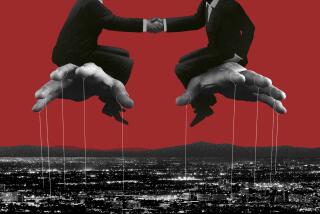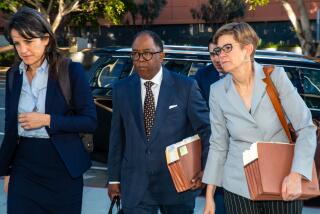Mood in Courtroom at Mayor’s 2nd Trial Calmer Than for 1st
- Share via
San Diego Mayor Roger Hedgecock participated in a conspiracy in which a close friend’s political consulting firm “served as the . . . middleman” for illegal contributions to his successful 1983 mayoral campaign, Deputy Dist. Atty. Charles Wickersham told jurors Tuesday in his opening argument in the mayor’s felony retrial.
However, the mayor’s attorney, Oscar Goodman, dismissed the prosecutor’s statement as “a road map . . . filled with mines” and told the eight-woman, four-man jury during his own opening remarks that Hedgecock and his inner circle of campaign aides “were doing everything they could to comply” with financial disclosure laws.
Both attorneys completed their opening statements Tuesday, clearing the way for the first witnesses in Hedgecock’s felony conspiracy and perjury retrial to begin testifying today. The trial is expected to last about 2 1/2 months.
The opening statements before Superior Court Judge William L. Todd Jr. took place in an atmosphere markedly more restrained than the circus-like aura that enveloped Hedgecock’s first trial. While the courtroom and adjacent hallway were packed with reporters and spectators during opening arguments in the first case, there were empty seats in the courtroom at the beginning of Tuesday’s session, which also lacked some of the first case’s electricity.
While the two attorneys’ opening statements were similar to those delivered in the first trial, Wickersham and Goodman displayed dramatically different styles Tuesday.
Wickersham, whose low-key manner has earned him the nickname “Mongoose,” spoke in a monotone and leaned on a lectern during most of his 102-minute oration, which was largely confined to a listing of numerous meetings and transactions that he argued reveal Hedgecock’s willful disregard for election and public disclosure laws. The prosecutor spoke in short, simple sentences, and was generally impassive throughout his remarks.
Nevertheless, both Goodman and Hedgecock were visibly angered by some of Wickersham’s accusations, with the mayor throwing down his pen at one point and shaking his head and snorting in disgust at another.
During a brief recess after Wickersham concluded, Goodman turned to Hedgecock and said, “I’m going right at him! Right at him!” And, the defense attorney did just that.
Goodman, who was much more theatrical and caustic during his 95-minute statement--referring, for example, to key prosecution witness Harvey Schuster as “a liar”--opened his remarks by reminding the jurors that Todd had described the attorneys’ arguments as “a road map and guide to help you understand the evidence.
“I am constrained at this point in time to point out to you that the road map which you received from the prosecution is filled with mines,” Goodman said, his voice rising.
Charging that Wickersham inaccurately characterized key pieces of evidence and testimony expected in the trial, Goodman added, “Those are examples of what . . . we have to watch out for in a case. They’re mines, they’re traps. And in a courtroom, there is no room for trial by ambush.”
Hedgecock faces possible expulsion from office if he is convicted of at least one charge against him. He faces 15 felony counts alleging that he conspired with former principals of the bankrupt La Jolla investment firm of J. David & Co. to funnel about $267,000 in illegal donations to his 1983 campaign through a political consulting firm owned by Tom Shepard, a close friend of the mayor.
Prosecutors also allege that Hedgecock intentionally falsified financial disclosure statements to conceal those campaign transactions as well as personal financial aid--used primarily to remodel his South Mission Hills house--from former J. David executives J. David (Jerry) Dominelli and Nancy Hoover. The mayor also faces a single conflict-of-interest charge. Shepard, Dominelli and Hoover face similar charges, but will be tried separately later.
Hedgecock, whose first trial ended last February in a mistrial with the jury deadlocked 11-1 in favor of conviction, has denied knowledge of any illegal campaign contributions, portraying the $267,000 as a routine business investment in Shepard’s firm by Hoover and Dominelli. The mayor concedes that there were omissions and errors on his financial reports, but describes those mistakes as inadvertent ones later corrected through amendments cited by Goodman as evidence of the mayor’s “good-faith . . . effort” to comply with the law.
Telling the jurors--selected over an unusually long nine-day process--that they were “about to embark on a long and difficult journey,” Wickersham said that Hedgecock and his supporters began plotting a possible mayoral campaign shortly after Hedgecock had been reelected as a San Diego County supervisor in June, 1980.
Shepard, who at the time served on Hedgecock’s supervisorial staff, left the county payroll in early 1982 to start a consulting business--a firm formed primarily, Wickersham argued, so that Hedgecock would be “ready to go” in the event that then-Mayor Pete Wilson was elected or appointed to higher office. Following Wilson’s November, 1982, election to the U.S. Senate, Hedgecock won a special May, 1983, race to serve the remaining 18 months in Wilson’s unexpired term.
With Hoover and Dominelli financing the operation, Shepard’s firm spent most of 1982 updating a computerized mailing list that Hedgecock shared with then-county Supervisor, now U.S. Rep. Jim Bates, organizing precincts and doing other preparatory work for a possible mayoral campaign, Wickersham said. Hedgecock’s campaign committee never paid for that early work, the prosecutor contended, adding that the $26,000 that the group later paid Shepard throughout the mayoral race “didn’t come close” to covering his firm’s campaign-related costs.
“Initially, (Shepard) had very few clients,” Wickersham said. “But Tom Shepard had a client, a non-paying client--the defendant.”
Throughout his remarks, Wickersham repeatedly pointed to allegedly illegal or undisclosed aid that Hedgecock received from Shepard’s firm, Hoover, Dominelli or others. Then, referring to Hedgecock’s various financial disclosure reports, Wickersham invariably added, “Nowhere on this statement is there any reference” to the alleged impropriety.
The prosecutor also told the jurors that Hedgecock’s explanation that the errors on his financial reports are attributable to, at worse, carelessness or confusion, is contradictory to the fact that the mayor is “an extremely intelligent person who . . . is very sophisticated in financial matters.”
Goodman, however, labeled Wickersham’s theory of the case “an absurdity” arising out of the prosecution’s attempt to “look backward . . . and try to put together a jigsaw puzzle” by seeking to link isolated events into a conspiratorial plot to circumvent the city’s $250-per-person contribution limit.
“There was no secret or illicit (agreement) between Roger Hedgecock and anyone,” Goodman said. Noting that Wilson’s departure from City Hall did not become a certainty until November, 1982, Goodman argued that “it’s not logical” to characterize the Shepard firm’s earlier activities as planning for Hedgecock’s mayoral campaign.
Rather, the firm was simply complying with a pact between Hedgecock and Shepard whereby the then-supervisor allowed his former staffer to use the computerized mailing list to attempt to attract other clients in return for relieving Hedgecock of the burden of maintaining and updating it, Goodman contended.
Later, Shepard’s firm treated the Hedgecock campaign as a “loss leader” designed to enhance the fledging company’s reputation, the defense attorney said. However, because there was a valid contract between the firm and Hedgecock’s campaign, Dominelli’s and Hoover’s infusions of capital in Tom Shepard & Associates “cannot be considered . . . illegal campaign contributions,” Goodman added.
“You’re dealing with Roger Hedgecock’s state of mind,” Goodman said. “A leopard doesn’t change his spots. . . . If he is corrupt, if he is deceitful, we invite you to find him guilty of everything. But if, as I think you will . . . you find him truthful, that if in fact a mistake was made, it was an honest mistake, a reasonable mistake even for a mayor . . . then you must return a verdict of not guilty.”
Goodman also emphasized that Hedgecock, like most politicians, relied on aides to prepare his financial disclosure statements and, while he signed the reports under penalty of perjury, gave the documents only cursory attention.
“That’s no excuse,” Goodman said. “Roger Hedgecock was the gentleman who signed the form. He’s signing them and he’s committing himself that they’re true. But as far as his state of mind is concerned . . . he has a right to rely on the persons preparing them.”
One of the key pieces of evidence in the case concerns a $130,000 oral agreement loan that Hedgecock received from Hoover to remodel his house.
Charging that Hoover and Dominelli actually spent nearly $200,000 on the remodeling project, Wickersham contended that “bills were juggled . . . to come up with the $130,000 figure” because that was as much as Hedgecock could pay when J. David’s collapse in early 1984 threatened to expose his ties to the firm and its top officials.
Moreover, Wickersham argued that Hedgecock “never (had) any intent” of repaying the loan and probably would not have done so were it not for his desire to “put distance” between himself and the discredited company.
Goodman, though, said that even if the $130,000 figure is not accurate, Hedgecock cannot be blamed because “he repaid all . . . that he was told was spent” on the project. In addition, Goodman added that the fact that Hedgecock and his wife closely monitored the remodeling project in an attempt to hold down costs demonstrated that the money from Hoover “was in fact a loan . . . not a free ride.”
The defense attorney reserved some of his most acerbic comments for investment counselor Schuster, a key prosecution witness who testified during the first trial that, as early as November, 1981, Hedgecock had told him that Dominelli and Hoover intended to finance Shepard’s firm so it would be able to run Hedgecock’s subsequent mayoral campaign.
In the first case, defense attorney Pancer argued that Schuster lied because of his anger over Hedgecock’s vote not to award a lucrative county contract to him--a theme that Goodman expanded on Tuesday.
“Mr. Schuster provides the sex appeal in this case, and Mr. Schuster is a liar,” Goodman said. “The evidence will show that he talks out of both sides of his mouth when he’s attempting to accomplish an objective, and his objective from this witness stand . . . is to attempt to hurt Mayor Hedgecock.”
More to Read
Sign up for Essential California
The most important California stories and recommendations in your inbox every morning.
You may occasionally receive promotional content from the Los Angeles Times.












